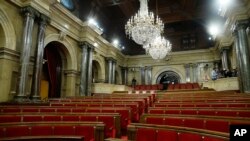Catalan separatist lawmakers who want to re-elect their fugitive ex-president suffered a setback Tuesday when the house speaker postponed a planned regional parliament meeting, saying it wouldn't take place until there were guarantees Spanish authorities "won't interfere."
The decision by Roger Torrent came after Spain's top court ruled Saturday that Carles Puigdemont, who fled to Belgium three months ago and faces arrest if he returns, could only be re-elected if physically present in the parliament in Barcelona. The court also ordered that he must obtain permission to appear at parliament from the judge investigating him over Catalonia's independence bid.
The Constitutional Court rejected an appeal by Puigdemont's party Tuesday, in effect denying the speaker's demands to allow Puigdemont's re-election without legal impediments.
The delay in the re-election leaves the future government of the prosperous region in something of a limbo. The parliament was initially scheduled to have a first investiture vote by Wednesday, but it's now not known when the speaker may call it.
Puigdemont's party, which along with other separatist parties has a slim majority in the chamber, was caught off guard by the suspension.
"I am not going to propose a candidate other than Puigdemont," Torrent said. "President Puigdemont has all the right to be elected."
"The Spanish government and the Constitutional court aim to violate the rights of millions of Catalans and this we will not accept," he added.
Spain's government welcomed Torrent's decision. An official speaking anonymously in line with government rules said that pressure applied by the government and the country's top court "have prevented a mockery of our democracy."
Puigdemont is one of more than a dozen Catalan political figures facing possible rebellion and sedition charges following the previous parliament's illegal and unsuccessful declaration of independence in October, which brought Spain's worst political crisis in decades to a head.
Spain seized control of the region by firing Puigdemont and his government and dissolving parliament following the independence declaration. It says it will keep control until a new government takes office following elections held December 21.
Dozens of extra police were deployed outside the parliament building and helicopters hovered overhead in a bid to detect Puigdemont if he tried to turn up clandestinely. Border controls have also been stepped in recent days.
Several hundred pro-independence supporters rallied near a park surrounding the building, many donning Puigdemont masks. As tension built up, a few hundred protesters broke through the police cordons into the park and made their way to parliament's gates. They shouted slogans in support of Puigdemont and Catalonia's independence before peacefully abandoning the area by dusk.
Earlier, Prime Minister Mariano Rajoy urged the Catalan parliament to drop Puigdemont's candidacy and opt for a "clean candidate" who is willing to obey the law and work for the return of normality in Catalonia, a region of 7.5 million inhabitants and which represents a fifth of Spain's gross domestic product.




